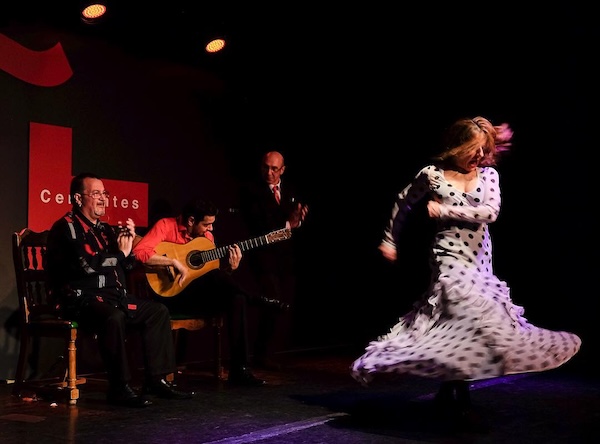Dance Preview: Feeling Together — Omayra Amaya’s Flamenco Returns
By Debra Cash
International flamenco artist Omayra Amaya’s upcoming Boston shows represent a moment of both reunion and reflection.

Omayra Amaya in performance. Photo: courtesy of the artist
She was a toddler interrupting her parents’ flamenco performances; a teenage summer student in Manhattan cutting her teeth on jazz dance rhythms under the tutelage of Betsy Haug and Luigi; and a student at the Boston Conservatory wondering how to fuse contemporary movement with her gypsy inheritance. Today, Omayra Amaya is an established international artist who returns to Boston January 31 through February 2 to present Antes del Fin (Before the End) in the new performance space at Arrow Street Arts in Cambridge.
Amaya, the Puerto Rican-born grandniece of the mid-century flamenco star Carmen Amaya, is based in Miami, where her widowed mother Olga lives, but has a special place in her heart for Boston, where, she says, “everything began for me. I have relationships that are over 30 years old and we’re still very connected.” She had barely graduated from the Conservatory when she was lured back from Spain to teach at the Conservatory. In 1994, she founded her company, Amaya, Flamenco Sin Limites. The company’s signature engagement was a six-show-a-week schedule at the Park Plaza in Boston — something that certainly hadn’t happened in Boston for decades, if ever. Tourists came for the nightclub atmosphere; Amaya used the time to explore her personal, adult flamenco language.
Her upcoming Boston shows represent a moment of both reunion and reflection. Last week she admitted over Zoom that she is aware of the passing of time, and “a world that no longer exists”:
We’re going into a completely different world where we are even more isolated from each other. With social media, we can have more access to so much. Before we only got to see the good [flamenco dance companies] or the ones that made it, or the ones that became international. Now we see everything. To be able to identify good from bad, you have to have a minimum level of knowledge or understanding.
I think that if I see a change in the audiences, it has to do with picking up the phone when you’re in a performance: everybody wants to film something.
But that human connection is so important, for us to share emotions, to feel together.”
The passionate interiority of the flamenco tradition, its duende, was, she says, born of oppression.
First, it’s in the cante, the song, because it was created out of an expression of the solitude, the oppression of the gypsies, their sorrows and their happiness. But even, like they say, “when they are happy, they cry,” you know, it’s because there’s a missing, a longing. And the movement itself, it’s like opening through movement, initiating in your deep core. You embody those melodies.
When everybody — the singer, the guitarist, the dancer — understands the language and they’re in the same place, that’s when magic happens.
We follow structures, but we don’t know exactly what’s going to happen. And that it’s alive. It’s not a set piece that has been choreographed. In flamenco, there’s always sections that are left for improvisation. Where are we going to go? The moment will dictate. And the audience has as much to do as the singer and the dancer, and in that sense, we are truly alive and being in the moment.
Flamenco relies on collaboration, and Amaya is enthusiastic about her current creative partners, with whom she has been rehearsing in Granada. Dancer Ivan Vargas Heredia grew up as part of the Los Maya flamenco dynasty, and they share the experience of being born into the art form. David Sanchez “El Galli” is, Amaya says, one of the new generation of flamenco singers, and American-born composer Roberto Castellon plays guitars he builds himself and combines the flamenco tradition with his Cuban background.
It’s these artists: when they go on stage, nothing else matters. They give 100%. They’re not doing a piece. They’re truly there. I mean, they don’t know how to do it any other way. And that’s rare nowadays. It’s a respect and admiration for flamenco because we respect it so much. We want to make sure we do justice and we do it well. So there’s a certain commitment. It’s love.
That’s what we share when we’re on stage. Feel it. We say: come and experience that with us.
Flamenco Dance Technique and Flamenco Dance Choreography Workshops
February 3-11, 2025 at the Dance Complex, Cambridge.
Debra Cash is a founding Contributing Writer for the Arts Fuse and a member of its Board.
Tagged: "Antes Del Fin (Before the End)", Arrow Street Arts, Ivan Vargas Heredia, flamenco
